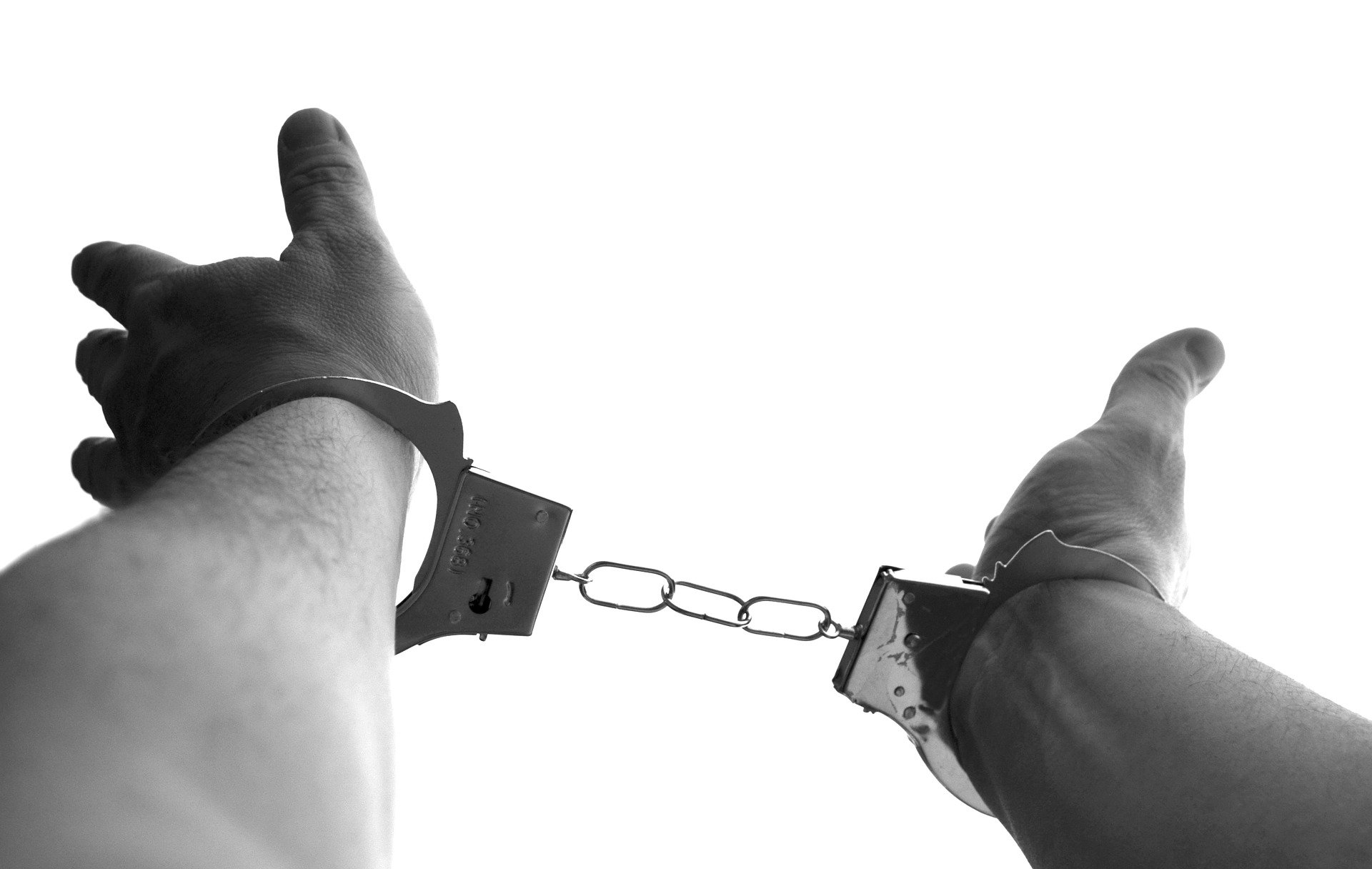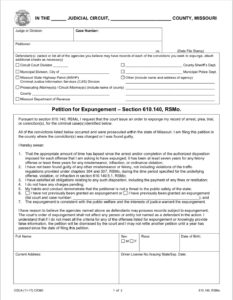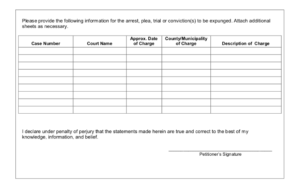
We’ve previously blogged about Missouri’s new expungement law which opened up the opportunity to have more than 1,900 criminal offenses expunged from the records of criminal defendants. If you are considering expunging of your criminal record, you will need to educate yourself about the process. Here is our guide to the new expungement process in Missouri.
Draft your Petition for Expungement
First you will need to draft a Petition for Expungement. You can get the standard form Petition for Expungement provided by the Missouri Supreme Court here. We have provided screenshots of the form below:


As you can see, you’ll need some information to get started filling out the form:
- The Circuit Court you were convicted in
- The case number
- Description(s) of the charge(s)
- The date you were convicted
- The county prosecutor that filed your case
- Information about any state agency that may have record of your arrest and/or conviction
- Your drivers license number
Once you have this information, you can begin filing out the form. The Circuit Court that you were convicted in will be the Court where you file your Petition for Expungement. Begin adding that court’s information to the top of the form. For example, if you were convicted in Boone County, fill out the top of the form so that it reads: “In the 13th Judicial Circuit, Boone County, Missouri.” You can find more information about the court circuit your local county court is in here. Sometimes figuring out how to get all of this information can be daunting. If you feel this way during the process, you should probably contact a criminal defense lawyer.
Next, you will then proceed to fill out the rest of the form adding your name as the Petitioner and the agencies you believe have records of your arrest and conviction. You will always need to add the local prosecutor that convicted you. For example, if you were convicted in Boone County, you were likely prosecuted by the Boone County Prosecutor and you will check the box for “Prosecuting Attorney” and indicate the county was Boone. You will also want to make sure you add the law enforcement agency that arrested you (i.e. Columbia Police Department, Boone County Sheriff, Missouri Highway Patrol, etc.)
Before you file
Before you file, remember that you will need to pay a $250 surcharge in additional to all applicable filing fees and service costs in your local county. Remember that this process can be overwhelming and a criminal defense lawyer can help you ensure your best possible chance of making this process successful. Additionally, verify that the offense(s) you are asking the court to expunge qualify under the new law. While there are many more offenses that qualify for expungement than before, there are still some that will not qualify. Examples of criminal offenses that do not qualify are:
- All Class A Felonies
- Any misdemeanor or felony involving domestic abuse
- Any dangerous felony
- Any crime requiring registration as a sex offender
- Any criminal offense where death is an element
Remember that the law does not change the eligibility for expungement of driving while intoxicated offenses. If you are trying to expunge DWIs, you will want to check those applicable laws and/or speak with a criminal defense lawyer to help.
You will also want to review the information on the first page of the Petition for Expungement (see above) because you are swearing or affirming that the following facts are true:
- It has been at least seven years if the offense is a felony, or at least three years if the offense is a misdemeanor, municipal offense, or infraction from the date the petitioner completed any authorized disposition imposed under section 557.011 for each offense, violation, or infraction listed in the petition;
- The person has not been found guilty of any other misdemeanor or felony, not including violations of the traffic regulations provided under chapters 304 and 307, during the time period specified for the underlying offense, violation, or infraction in subdivision (1) of this subsection;
- The person has satisfied all obligations relating to any such disposition, including the payment of any fines or restitution;
- The person does not have charges pending;
- The petitioner’s habits and conduct demonstrate that the petitioner is not a threat to the public safety of the state; and
- The expungement is consistent with the public welfare and the interests of justice warrant the expungement.
If the court finds that you have not met any of the required criteria for expungement, it will dismiss your Petition and you will be prohibited from refiling a Petition for Expungement for one (1) year.
File your Petition
If you have filled out the form, verified that the offense(s) you want expunged are eligible for expungement, and that you meet the necessary criteria, you are ready to file! Contact your local County Circuit Clerk’s office for more information on costs and how to file (each county’s process and fees may be different). Information for each county’s Circuit Clerk’s office can be found here. Once you file, the prosecutor will have thirty (30) days to object. Then the Judge assigned to your case will hold a hearing to determine if you are eligible for expungement and if the expungement is consistent with the public welfare and the interests of justice warrant the expungement.
As you can probably tell, this process can be overwhelming and daunting. It is always best to find a criminal defense lawyer that can help you through the process and make sure that you are in the best position possible to articulate to the court why your expungement is consistent with the public welfare and the interests of justice warrant the expungement. I promise that you will not want to come out of this process after having your Petition dismissed wishing you would have hired a lawyer. If you need help with this process, contact Chris today.

